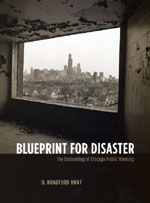Shedding new light on the unraveling of Chicago public housing

Chicago projects like Cabrini Green and the Robert Taylor Homes have gained national notoriety as some of the worst disasters in public housing since the federal programs that created them were born out of the wake of the Great Depression. Cabrini Green in particular stands out due to its immediate proximity to the upper-class Gold Coast neighborhood, the scar of poverty amongst Cabrini’s residents made painfully visible against a backdrop of an otherwise wealthy urban center.
But with the eventual acknowledgment of the projects’ failure and the subsequent tear-down of these two icons of failed policy, sociologists, government officials, and others have begun intensely scrutinizing the program’s history in an attempt to find out what went wrong, and to prevent it from happening again. One of the latest additions to the canon of sociological studies focusing on the failure of Chicago’s housing projects, D. Bradford Hunt’s Blueprint for Disaster: The Unraveling of Chicago Public Housing challenges explanations that attribute the projects’ decline primarily to racial discrimination and real estate interests, arguing that well-intentioned but misguided policy decisions—ranging from design choices to maintenance contracts—also paved the road to failure. As Elizabeth Taylor writes in a recent review of the book for the Chicago Tribune:
[Blueprint for Disaster] adds a new dimension to the debate by pointing to missed opportunities for the CHA to heed warning signs and change course and that policy choices at the local and federal level led to the demise of public housing. In an attempt to break new ground with his interpretation, Hunt locates the problems less with a poisonous mixture of political and real estate interests, governmental neglect and racism than the fact that there was no realistic financial plan for public housing and that residents were not engaged in the process.
Shedding new light on the unraveling of Chicago public housing, Hunt’s Blueprint for Disaster is an urgent reminder of the havoc poorly conceived policy can wreak on our most vulnerable citizens.
Read the rest of the Tribune review or see another recently appearing in the Chi-town Daily News.